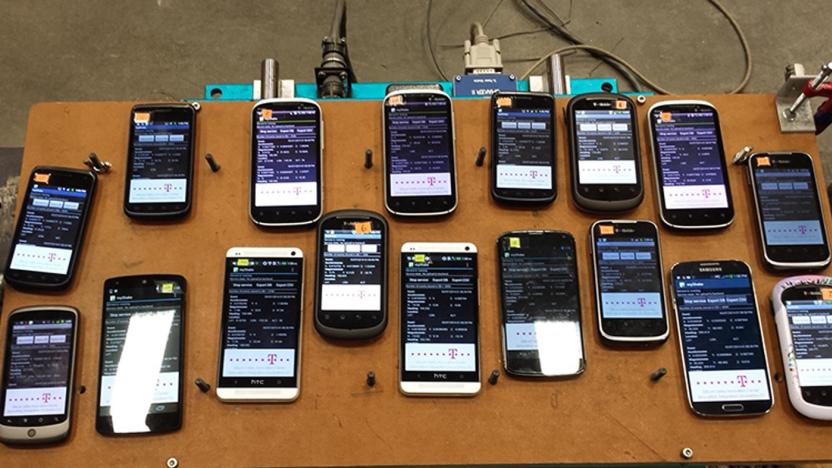crowdsourcing
Latest

ICYMI: Adorable robot overlords, all-in-one home brews and more
try{document.getElementById("aol-cms-player-1").style.display="none";}catch(e){}Today on In Case You Missed it: ASUS debuted a $600 home companion robot named Zenbo, who is designed to help out around the house (so long as its chores don't involve actually holding anything). Whirlpool launched an Indiegogo campaign to crowdsource a $1200 home brewing fermenting system that turns beer precursor into sippable suds in as little as a week. And we take a look at the upcoming VR game Mosh Pit Simulator, which will bring GoatSim-level insanity to your VR headset.

NASA and Wisconsin are covering the state with wildlife cameras
NASA's next search for life is headed somewhere close to home: into the woods of Wisconsin, where the space agency is partnering with the University of Wisconsin-Madison and the Wisconsin Department of Natural Resources to create "one of the richest and most comprehensive caches of wildlife data for any spot on our planet."

Waze hack lets creeps track your driving
Waze's community-centric navigation is supposed to help you avoid obstacles that other apps might miss, but that same technology is also creating some serious privacy issues. UC Santa Barbara researchers speaking to Fusion have found an exploit that would let an intruder track your driving in real time. After reverse-engineering Waze's server code, the researchers found that they could create thousands of ghost drivers that monitor the real drivers around them -- they can even create virtual traffic jams. The trick only works when you have the app in the foreground (Waze turned off background location sharing in January) and breaks when you turn on the invisibility mode, but that's not going to be much comfort to drivers running the app non-stop during their commutes.

Amateur astronomers caught a Jupiter impact on camera
Jupiter gets hit by wayward celestial objects surprisingly often (about once per year), but you'd be forgiven if you didn't know it. Not all of them are visible, and professionals can only observe so much. However, the rise in readily accessible astronomy tech just helped detect one of these encounters. Amateur astronomers from Austria and Ireland have recorded videos showing that something, most likely an asteroid or comet, struck Jupiter on March 17th. The collision only lasted for a split second (blink and you'll miss it in the videos below) but it was ferocious -- even if the object was only a few hundred feet across, Jupiter's intense gravity guaranteed a high-velocity impact that would be visible from Earth.

Wikipedia is developing a crowdsourced speech engine
Wikipedia announced on Thursday that it is collaborating with researchers from Sweden's KTH Royal Institute of Technology to develop an open, crowdsourced speech engine that will make the online encyclopedia more accessible to people with reading or visual impairments. Wikipedia estimates that 25 percent of its user base -- approximately 125 million people monthly -- will benefit from the new service. And while the engine will be optimized for use on Wikipedia itself, any site running MediaWiki software will be able to integrate it as well.

Vue wants you to crowdfund film screenings with your mates
Unless you've invested heavily in your own home theatre setup, it's unlikely that you're going to match the experience of watching a film at the cinema. UK movie chain Vue knows this, so instead of just letting you pay to go and see new releases, it wants you to you club together with your friends and family to put on a showing of your own. Think of it as Kickstarter, but for your favourite movies.

Android app turns your phone into an earthquake detector
Your smartphone can already warn you about earthquakes. UC Berkeley, however, is going one step further: it wants your phone to help detect those quakes. The school has released an Android app, MyShake, that uses your phone's motion sensors to detect the telltale signs of tremors and combine that with the data from every other user. For all intents and purposes, you become part of a crowdsourced seismic station network -- you can confirm a quake just by leaving your phone turned on. That could be a big help when there aren't enough fixed stations to trigger an alert through conventional apps.

NASA wants your ideas for its cube robot's arm
Think you could build a better robot arm than NASA? You now have a chance to prove it. The agency is teaming up with Freelancer to crowdsource ideas for the arm on Astrobee, a cute cube robot that will float around the International Space Station monitoring conditions and supplies. The first phase will have NASA pick the top 30 entries that meet some basic criteria. If you pass muster, you'll be asked to break down the architecture options for your design. Do that and NASA will run another crowdsourcing effort to solicit ideas for the subcomponents from those 30 submissions. Phew.

Wikipedia fund gives the site a long-term future
Wikipedia just turned 15 years old, but you wouldn't know it from the nigh-on inescapable donation drives -- the crowdsourced encyclopedia often seems as if it's months away from extinction. The Wikimedia Foundation (its parent organization) may have a way to keep the site around for the long haul, however. It's launching the Wikimedia Endowment, a "perpetual" support fund for Wikipedia and other Foundation efforts. The goal is to raise $100 million over the next 10 years, or enough to both improve its independence and give it room to grow.

Some 'Shenmue III' backers won't get their rewards after all
After breaking records with their Shenmue 3 Kickstarter campaign, the developers at Ys Net are taking an... interesting stance toward fans of the project. You see, as a result of the wildly successful crowdfunding campaign for another entry in the cult classic franchise, not everyone who wanted to get in on the action was able to before it ended. So Ys opened up a "slacker backer" period where folks could pledge their support (and dollars) via Paypal, adding to the $6 million already promised to the developers from Kickstarter backers. All good, right?

Google wants your suggestions for new illustrations in its Calendar
As a part of an overall Material Design facelift, last year Google added helpful illustrations to its Calendar app that automatically highlight what you'll be doing, and now it's expanding the feature. According to a post on the Gmail blog, there's now a dozen more illustrations for common events like weddings and Halloween parties (timely), and they can appear in up to 30 additional languages. It's not stopping there however, and is crowdsourcing suggestions for its next round of illustrations. You can suggest some photo inspiration by tweeting (but not Google+-ing) a picture with the hashtag #makethemost attached -- we're sure you will handle this power wisely.

WageSpot app wants you to see the salaries of everyone around
If you're on the hunt for a job, chances are good that getting a decent raise is part of your plan. Or at the very least, it's worth doing some research to figure out what others doing similar work are getting paid, so you can make sure you're getting what you're worth. There are a host of services for doing such research, particularly Glassdoor, but a new company called WageSpot thinks it can do an even better job of bringing its users smart salary data. The main focus for the WageSpot Android and iOS app that launches today is location-based salary data -- not only can you see what other engineers are making, you'll be able to see what ones in your city are making, and you can zoom in down to the individual level and literally see how much others near you are paid.

Computers can categorize buildings into architectural styles
Even if you've never heard of "Byzantine," you can probably tell a Byzantine church from a Gothic one. Judging style differences is nearly impossible for a computer, however, and researchers from the University of Massachusetts want to fill in that gap. They used geometric matching, crowdsourcing and machine learning to teach an algorithm how to spot similar styles in buildings, furniture and other objects. That's something that could be incredibly useful for historians with mountains of photo archives, or game designers who need to auto-fill a level with historically accurate furniture.

The US wants you to track endangered wildlife with your phone
The next time you go fishing, make sure to bring your smartphone... it might just help you protect an endangered species. The US Fish and Wildlife Service is partnering with the developers of mobile app FishBrain to crowdsource conservation data. A new feature in the free software lets you catalog as many as 50 threatened species (aquatic or otherwise) during a trip, helping conservationists find out both where these critters live and why their populations are dropping. It seems paradoxical to ask anglers for help saving coastal life, but it makes sense when you think about it -- they're the most likely to see these rare animals, and they're often well aware that extinction has dire consequences. The big challenge will simply be getting enough people using the app to provide meaningful input. [Image credit: AP Photo/John Flesher]

Google reopens Map Maker edits in August with your help
Google put Map Maker editing on ice in May after digital vandals got away with some rogue changes, but it's finally ready to get things back on track... if you're willing to pitch in. The internet giant says it will start reopening edits in early August, but it's asking the community to play a much larger role this time around. Instead of leaning primarily on Google itself for moderation, some Map Maker areas will also depend on Regional Leads (that is, eager volunteer cartographers) to review any tweaks.

Doomed Indiegogo campaign hopes to crowdfund Greece's debt relief
Can crowdfunding do something better than make a beer cooler with a built-in Bluetooth speaker? That's what Thom Feeney believes after setting up an Indiegogo campaign to pay Greece's $1.7 billion loan fee that it owes to the International Monetary Fund. The project is hoping to raise the cash by encouraging all of Europe's 503 million citizens to kick in a few bucks for a postcard, a Greek salad or vouchers for a bottle of Ouzo. The page has been up for just over two days and already the figure stands at €200,000 ($223,000), although that's still less than a tenth of a percent towards the final figure.

Dark Sky uses your iPhone's sensors to improve weather forecasts
Your iPhone gives you weather forecasts right from the get-go, but it's now ready to shape those forecasts as well. Dark Sky has given its iOS app a big overhaul that, if you like, uses the barometer on your iPhone 6 or 6 Plus to contribute pressure readings. The hope is that these will dramatically improve short-term forecasts in the future -- you'll know that it's about to rain because iPhones nearby gave you a heads-up. There have been apps that crowdsourced pressure data before, but rarely with the intent to directly improve forecasts -- and not on the scale of Dark Sky, one of iOS' best-known weather tools.

DARPA wants you to help with its terrifying schemes... by gaming
If you like playing online games, then you too can help birth some (possibly sinister) software from DARPA. The US Army's slightly insane research division launched its Verigames web portal in late 2013 with five free online games designed to crowdsource coding. How? Like a similar effort that folded AIDS proteins, the games "translate players' actions into program annotations," to kill numerous bugs in systems code, according to DARPA. The first experiment was a success and "produced hundreds of thousands of (code) annotations," so the agency plans to expand the program with five new games.

Sweden's 'dream home' crowdsourced from 200 million web searches
If you adore box-like, red houses with open kitchens and around 1,200 square feet of space, guess what! You're an average Swede, apparently. Real estate site Hemnet and architects Tham & Videgård came up with the design by crowdsourcing preferences for size, number of rooms and floors, using 200 million clicks on 86,000 properties. "The result is partly a mathematical translation of the statistical 1.5 floors within a cubic volume," according to the team. The home makes the open kitchen the focal point of the house, highlighting its social importance to Swedes.

T-Mobile hopes to draw you in with crowdsourced coverage maps
If you've relied on carrier coverage maps to decide who gets your business, you know that they're sometimes sketchy. A good connection on the map could still mean lousy service in your neighborhood, for instance. T-Mobile thinks it has a better solution: it just launched a crowdsourced coverage map. Instead of simply predicting the quality you're likely to get, the map draws on usage data (including customer reports and speed tests) to tell you what connections you can realistically expect. The maps are also updated twice a month, so you won't have to trust that months-old information is still accurate.







